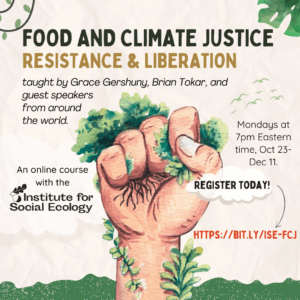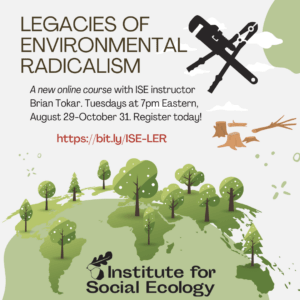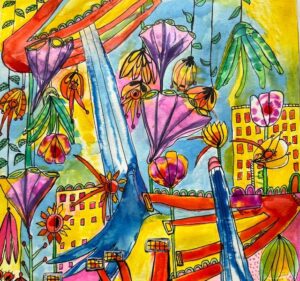The Institute for Social Ecology offers online courses on an ever-expanding variety of topics. Our seminars combine weekly interactive video seminars with ISE faculty and participants from across the globe, video lectures and readings, and online discussion forums. Many courses are also available for academic credit through Vermont State University. Please inquire if you are interested in this option.
Classes are generally offered 1-2 times a year (check individual course pages below for time/date details). All our courses are also available in a self-directed format featuring the syllabus and materials but without the fixed time commitment of the weekly seminar. Registration (without credit) for the full seminars is $100, and $50 for the self-directed version. We try to make our programs affordable while also covering costs; payment plans and need-based scholarships are available. Please inquire for details. To enroll in our classes, register on the relevant course page.
Our 2024 Course Offerings:
The Philosophy and Politics of Social Ecology with Chaia Heller. Begins November 1, on Wednesdays at 7pm Eastern for eight weeks.
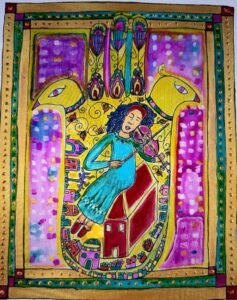
This course offers a deep dive into the philosophy and politics of social ecology designed for both newcomers to the theory and for those well versed in Bookchin’s work. Taught by longtime ISE faculty member Chaia Heller, the course addresses epistemological questions that offer a rethinking of nature and human nature that transcends racist, patriarchal, and colonial outlooks that, in turn, open the way to envision a free, democratic, and ecological society. We’ll also take on a central and fraught question of social and ecological ethics. Using anti-racist and feminist perspectives, we’ll consider how to ground an ethics in a dialectical and ‘situated’ approach to both making and evaluating knowledge claims. During the second half of the course, we’ll apply social ecology’s epistemological and ethical frameworks to creating a utopian and democratic political praxis. We’ll address Bookchin’s communalist project, exploring crucial questions including ‘what is dual power?’ and ‘how do we bring revolutionary perspectives to our work in social and ecological movements?’ Register here.
Solarpunk, Art, and Social Ecological Aesthetics with the Solarpunk Surf Club. Begins March 5, Tuesdays at 7pm Eastern for ten weeks
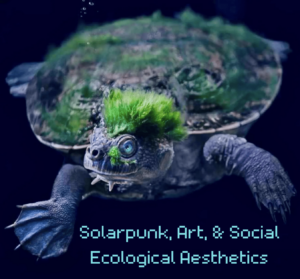
Solarpunk is an emerging visionary utopian aesthetic that critically engages the reality of capitalist catastrophe while maintaining a radical optimism about humanity’s potential for a communal, ecological future. Solarpunk conjures visions of beauty and harmony in both formal and social senses—scenes of vibrant neighborhood life, biophilic architecture, and liberatory uses of jugaad-style technologies. The worlds depicted within broad currents of the solarpunk milieu are utopian yet realist, post-scarcity but not post-conflict, and uncompromisingly ecological without lapsing into primitivism or misanthropy. In other words, solarpunk worlds appear to be holistically articulated visions of social ecology; or, what Bookchin called “the image of a fecund interaction between humanity’s craft and nature’s potentialities.”
Social ecology is a comparably mature radical political theory that posits the ecological crisis as a social crisis, and visa-versa, in which the domination of nature is inextricably linked to the domination of human beings. Through the oppositional struggle to overcome all forms of hierarchy and domination, the theory envisions a free, caring, and ecological society in which humans have successfully reharmonized the interrelationships between ourselves, technology, and the rest of the living world. Drawing on the best of Marxism, anarchism, and traditional ecological knowledge, social ecology synthesizes a systematic understanding of socialism and critique of capitalism with a commitment to anti-statism, feminism, direct democracy, and confederal strategies of prefiguration. Social ecology, therefore, offers a comprehensive integration of philosophy, politics, ethics, and epistemology. As a living tradition, social ecology continues to develop through theory and practice. A philosophy of art and a theory of beauty—or, the realm of aesthetics—remains one notable opportunity for further inquiry.
This course investigates the potential of solarpunk as an aesthetic complement to social ecology and social ecology as a compelling political-philosophical ground for solarpunk. Students will explore the intersections of art, solarpunk, and social ecology alongside Solarpunk Surf Club through texts, images, objects, discussion, and project-based making. We will begin by evaluating art historical antecedents to solarpunk such as Proletkult and the theories of Aleksandr Bogdanov, William Morris and the Arts & Crafts movement, and the animated films of Hayao Miyazaki. Next, we will examine political tensions within solarpunk surrounding greenwashing, recuperation, and the competing tendencies of ecomodernism and cottagecore. In the final weeks, we will share and analyze examples of relevant contemporary art in a variety of forms, culminating in the attempt to elaborate upon social ecological aesthetics through the production of original creative work.
Ecology, Democracy, Utopia: Introduction to Social Ecology — co-taught by the ISE faculty. Dates TBD, next offered Fall 2024.
A rotation of ISE faculty provide a comprehensive overview of social ecology, an interdisciplinary body of ideas that examines social and ecological problems from a transformative and 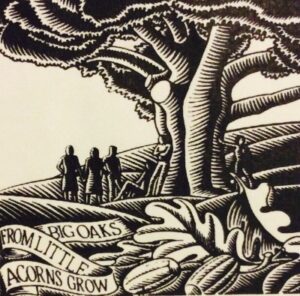 holistic perspective. Students learn the foundations of social ecology and apply these insights to a variety of contemporary political and ecological problems, sharpening their understanding of the world while developing visionary ideas to change it. The course explores a broad range of interconnected themes including: social theory, hierarchy and domination, gender, race, capitalism, nature philosophy, food and technology, direct democracy and the state, political organizing and movement history, and reconstructive vision. Offered most years during the fall season, sometimes more than once in a year. Register here.
holistic perspective. Students learn the foundations of social ecology and apply these insights to a variety of contemporary political and ecological problems, sharpening their understanding of the world while developing visionary ideas to change it. The course explores a broad range of interconnected themes including: social theory, hierarchy and domination, gender, race, capitalism, nature philosophy, food and technology, direct democracy and the state, political organizing and movement history, and reconstructive vision. Offered most years during the fall season, sometimes more than once in a year. Register here.
Other Course Offerings:
These are previous courses not currently being offered, but which can all be taken as self-directed flex courses at any time.
Food and Climate Justice: Resistance and Liberation, with Brian Tokar and Grace Gershuny. Begins October 23 on Mondays at 7 pm Eastern for eight weeks.
As the world faces intersecting crises of climate, health, and multiple social inequities, movements for climate and food justice are playing a central role toward developing a community-centered grassroots response. These movements share common themes, viewing the sources of these crises in institutions of hierarchy and domination, including capitalist structures of racism and colonialism. The extraction of resources and exploitation of marginalized populations for food and energy production, especially in the Global South, are major contributors to worldwide environmental and social degradation. This course will offer a Social Ecology perspective on the background and potential of the climate and food justice movements to resist further damage from fossil fuels and agribusiness dominance, while building ecologically harmonious and equitable food and energy systems that can restore soil health, biodiversity, and climate stability. Register here.
Legacies of Environmental Radicalism with Brian Tokar. Begins August 29, on Tuesdays at 7pm Eastern for ten weeks.
Over nearly six decades, radical ecologists with widely varied outlooks and philosophies have begun to transform the field – frequently a tool of colonialism and corporate resource management in its earlier years – and developed modes of action that are aimed toward the radical transformation of society. This ten-week class will examine that history in depth and illustrate how social ecologists and many others have helped advance the story of environmental radicalism from the 1960s to the present. We will explore a variety of perspectives both in theory and praxis, many of which were influenced by social ecology and also helped shape its own evolution. We will also examine recent trends toward nihilistic and apocalyptic views in the environmental movement and how social ecology and a broadly internationalist perspective can help us reach beyond those tendencies. Register here.
Commune, Council, Party: Marxism and Direct Democracy with Mason Herson-Hord.
While Marx himself championed the sweeping democratization of society, he rarely discussed the particulars of a future democratic political structure in any detail. His disciples among subsequent generations of revolutionaries had to bridge the ambiguities of Marx’s political theory with the practical necessity of determining how power is to be organized in real movements seeking to change the world. How and to what extent should the ideas, goals, and desires of ordinary working people be translated into political action? And through what institutional means? These matters are inescapable and occupy center stage in the politics of social ecology, yet revolutionaries and Marxists in particular have struggled with them; indeed, the British Marxist Ralph Miliband observed that “the exercise of socialist power remains the Achilles’ heel of Marxism.”
We will explore Marxist thought and practice through history as it grapples with this fundamental question: what are the political forms of the class struggle?—and do some grappling with it ourselves. Marxist theory may not have produced the most definitive answers, but its contradictions and its tensions with direct democratic practice are so fruitful in helping us think through these problems ourselves, especially when put in conversation with the core insights of social ecology. A primary goal of the course is for participants to challenge and rethink our ideas through discussion and reading of works spanning one hundred and fifty years of radical thought on revolution, political power, class struggle, and democracy.
Feminism and Ecofeminism: A Social Ecology Approach with Chaia Heller. Begins March 14, Tuesdays at 1 pm US Eastern time for eight weeks. New course!
This class explores the many stranded feminist and ecofeminist movements, looking at their various theoretical and activist tendencies through a social ecology lens. Taking a one-room schoolhouse approach, the class is designed for both newcomers and those familiar with the dynamic fields of social ecology, feminism, and ecofeminism. After providing a social ecology analysis of first and second wave feminism, we’ll explore a range of ecofeminist perspectives on issues including cis-heteropatriarchy, antiracism, anti-colonialism, and intersectionality as well as science, climate justice, and direct democracy.
We’ll also take on epistemological challenges, exploring how ideas such as intersectionality, sex/gender diversity, and dialectical biology can complexify categories of ‘woman’ and ‘nature’ so central to all feminist theory. Throughout, we’ll also be mindful of the relationship between the particular and general dimensions of the revolutionary project, discussing how particularized forms of sex/gender-based oppression are central to the general humanitarian project to create a non-hierarchical, directly democratic, and ecological society.
History and Philosophy of Biology with Joseph Madison.
This course will provide an overview of the historical development of various strands of philosophical thought in the biological sciences, with an emphasis on ecology and evolution. This overview will range from ancient proto-naturalistic thinking to contemporary philosophy of biology, to include ongoing debates with broad societal implications. The course will draw on student discussion and critical thinking as a means for analysis of the emergence, intermixing, and fading of these philosophies. By the end of the course students will be able to understand and analyze the historical development of the dominant philosophical paradigms in the biological sciences. Students will also have practice in contextualizing and critiquing the historical and philosophical bases of related social issues such as neo-eugenics and the biodiversity crisis.
Each segment will generally focus on advancing periods of history in the biological sciences, while also taking into account material from previous historical periods/discussions. This approach will aid in understanding the development and motivation of the underlying philosophical paradigms, to include the present day. Our weekly sessions will include interviews and presentations by biologists and philosophers as well as supplemental readings and other audio-visual resources. This course aims to use an interrelated analysis of both history and philosophy so that students can critically engage trends in contemporary biological thought, research, and related sociopolitical issues. We will learn from biologists, philosophers, historians, and activists in their historiograhies, analysis, and critiques of philosophies of biology. Towards the end of the course, we will also explore the potential role of social ecology in informing critique and analysis of philosophical bases in contemporary biological issues.
Frankfurt School Critical Theory is a nine-unit seminar that introduces the core concepts, thinkers, and texts of this famously rich yet challenging school of radical thought. These transdisciplinary thinkers have been a foundational influence on social ecology, which has drawn on their penetrating analyses of a wide array  of topics including capitalism, fascism, modernity, reason, science and technology, nature, pop culture, mass media, aesthetics, the left, and more. Participants will read foundational texts including Horkheimer and Adorno’s Dialectic of Enlightenment, Adorno’s Negative Dialectics, Herbert Marcuse’s One Dimensional Man, exploring their continued relevance for contemporary political and theoretical questions related to capitalism, imperialism, modernity, culture, race, gender, colonialism, and more.
of topics including capitalism, fascism, modernity, reason, science and technology, nature, pop culture, mass media, aesthetics, the left, and more. Participants will read foundational texts including Horkheimer and Adorno’s Dialectic of Enlightenment, Adorno’s Negative Dialectics, Herbert Marcuse’s One Dimensional Man, exploring their continued relevance for contemporary political and theoretical questions related to capitalism, imperialism, modernity, culture, race, gender, colonialism, and more.
Understanding Antisemitism: Historical Roots & Contemporary Relevance is a five-session seminar that explores antisemitism in history and social theory.  Recent events – from the deadly Pittsburgh synagogue shooting, the alt-right’s chant of “Jews will not replace us,” up to recent controversies within the Women’s March and UK Labour Party – have demonstrated a critical need to understand antisemitism as an ongoing threat that requires analysis and action from an emancipatory perspective. Co-taught by Robert Ogman (PhD Sociology, De Montfort University) and Peter Staudenmaier (Professor of History at Marquette University), each week participants will discuss assigned texts after a short input by the instructors.
Recent events – from the deadly Pittsburgh synagogue shooting, the alt-right’s chant of “Jews will not replace us,” up to recent controversies within the Women’s March and UK Labour Party – have demonstrated a critical need to understand antisemitism as an ongoing threat that requires analysis and action from an emancipatory perspective. Co-taught by Robert Ogman (PhD Sociology, De Montfort University) and Peter Staudenmaier (Professor of History at Marquette University), each week participants will discuss assigned texts after a short input by the instructors.
Rethinking Social Transformation is a five-unit seminar that explores the tension between transformative social change and practical political action. It 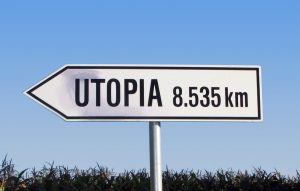 engages with questions of dialectical thinking, state theory, agency, and political strategy. Participants will read and discuss texts by Murray Bookchin, Karl Polanyi, Karl Marx, David Harvey, Nicos Poulantzas, and others, with short contextualizing lectures by instructor Dr. Robert Ogman.
engages with questions of dialectical thinking, state theory, agency, and political strategy. Participants will read and discuss texts by Murray Bookchin, Karl Polanyi, Karl Marx, David Harvey, Nicos Poulantzas, and others, with short contextualizing lectures by instructor Dr. Robert Ogman.
All courses are also available in a self directed format featuring the same material minus the weekly time commitment of the live seminar ($50).
To enroll or get more information, complete the form on the specific class page, or write us at social-ecology@mail.mayfirst.org. Taking a course for credit requires additional registration and a different fee structure, please indicate on the form or write us directly: social-ecology@mail.mayfirst.org.

